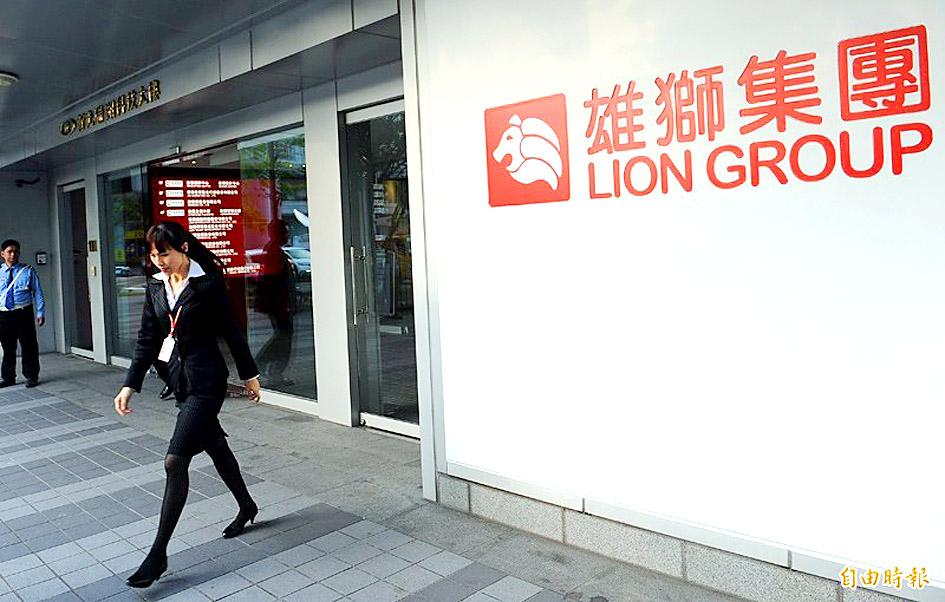Tourism firms are planning to recruit new workers in the hope that the government would ease or lift border restrictions in the second half of this year.
Taiwan has had one of the world’s strictest border controls during the COVID-19 pandemic including a ban on foreign tourists. The nation also required all overseas arrivals to undergo 14 days of quarantine from March 2020 to March this year.
The restrictions have led to a considerable decline in overseas arrivals, from 11.86 million in 2019 to 140,479 last year, hurting companies catering to international travelers.

Photo: Chen Hsin-yu, Taipei Times
The mandatory quarantine period was in March lowered to 10 days and then to seven days last month, raising hopes of a reopening this year, including at companies like Lion Travel Service Co (雄獅旅行社).
Lion Travel yesterday said it plans to bring its workforce back to pre-pandemic levels and would recruit 500 people for its marketing, management, digital technology and product development departments.
The company said new recruits would be hired in Taipei, Taichung, Chiayi City, Kaohsiung, Pingtung City and Taitung City. They would also have the opportunity to work at its overseas offices in the Asia-Pacific region and North America.
Lion Travel employs about 1,800 people, and has overseas offices in Japan, Thailand, the US, Canada, Australia, New Zealand, China and Hong Kong, company spokeswoman Ann Lai (賴一青) said, adding that it is planning to open a new branch in South Korea.
Cathay Hospitality Management Co (國泰商旅), which operates several hotels in Taiwan, such as Madison Taipei (台北慕軒) and Hotel Cozzi (和逸), has also announced plans to hire more people.
The company said it might hire about 100 new employees, with openings in the concierge, room services and catering areas.
The InterContinental Kaohsiung (高雄洲際酒店), part of the InterContinental Hotels Group, also announced a new recruitment drive.
InterContinental Kaohsiung general manager Robbert Manussen said the new hires would work at the soon-to-open Hotel Indigo Alishan (阿里山英迪格酒店) in Chiayi County as well as at other InterContinental hotels in Taichung and Taipei.

Zhang Yazhou was sitting in the passenger seat of her Tesla Model 3 when she said she heard her father’s panicked voice: The brakes do not work. Approaching a red light, her father swerved around two cars before plowing into a sport utility vehicle and a sedan, and crashing into a large concrete barrier. Stunned, Zhang gazed at the deflating airbag in front of her. She could never have imagined what was to come: Tesla Inc sued her for defamation for complaining publicly about the vehicles brakes — and won. A Chinese court ordered Zhang to pay more than US$23,000 in

Taiwan Semiconductor Manufacturing Co (TSMC, 台積電) yesterday said that its investment plan in Arizona is going according to schedule, following a local media report claiming that the company is planning to break ground on its third wafer fab in the US in June. In a statement, TSMC said it does not comment on market speculation, but that its investments in Arizona are proceeding well. TSMC is investing more than US$65 billion in Arizona to build three advanced wafer fabs. The first one has started production using the 4-nanometer (nm) process, while the second one would start mass production using the

US President Donald Trump has threatened to impose up to 100 percent tariffs on Taiwan’s semiconductor exports to the US to encourage chip manufacturers to move their production facilities to the US, but experts are questioning his strategy, warning it could harm industries on both sides. “I’m very confused and surprised that the Trump administration would try and do this,” Bob O’Donnell, chief analyst and founder of TECHnalysis Research in California, said in an interview with the Central News Agency on Wednesday. “It seems to reflect the fact that they don’t understand how the semiconductor industry really works,” O’Donnell said. Economic sanctions would

‘NO DISRUPTION’: A US trade association said that it was ready to work with the US administration to streamline the program’s requirements and achieve shared goals The White House is seeking to renegotiate US CHIPS and Science Act awards and has signaled delays to some upcoming semiconductor disbursements, two sources familiar with the matter told reporters. The people, along with a third source, said that the new US administration is reviewing the projects awarded under the 2022 law, meant to boost US domestic semiconductor output with US$39 billion in subsidies. Washington plans to renegotiate some of the deals after assessing and changing current requirements, the sources said. The extent of the possible changes and how they would affect agreements already finalized was not immediately clear. It was not known